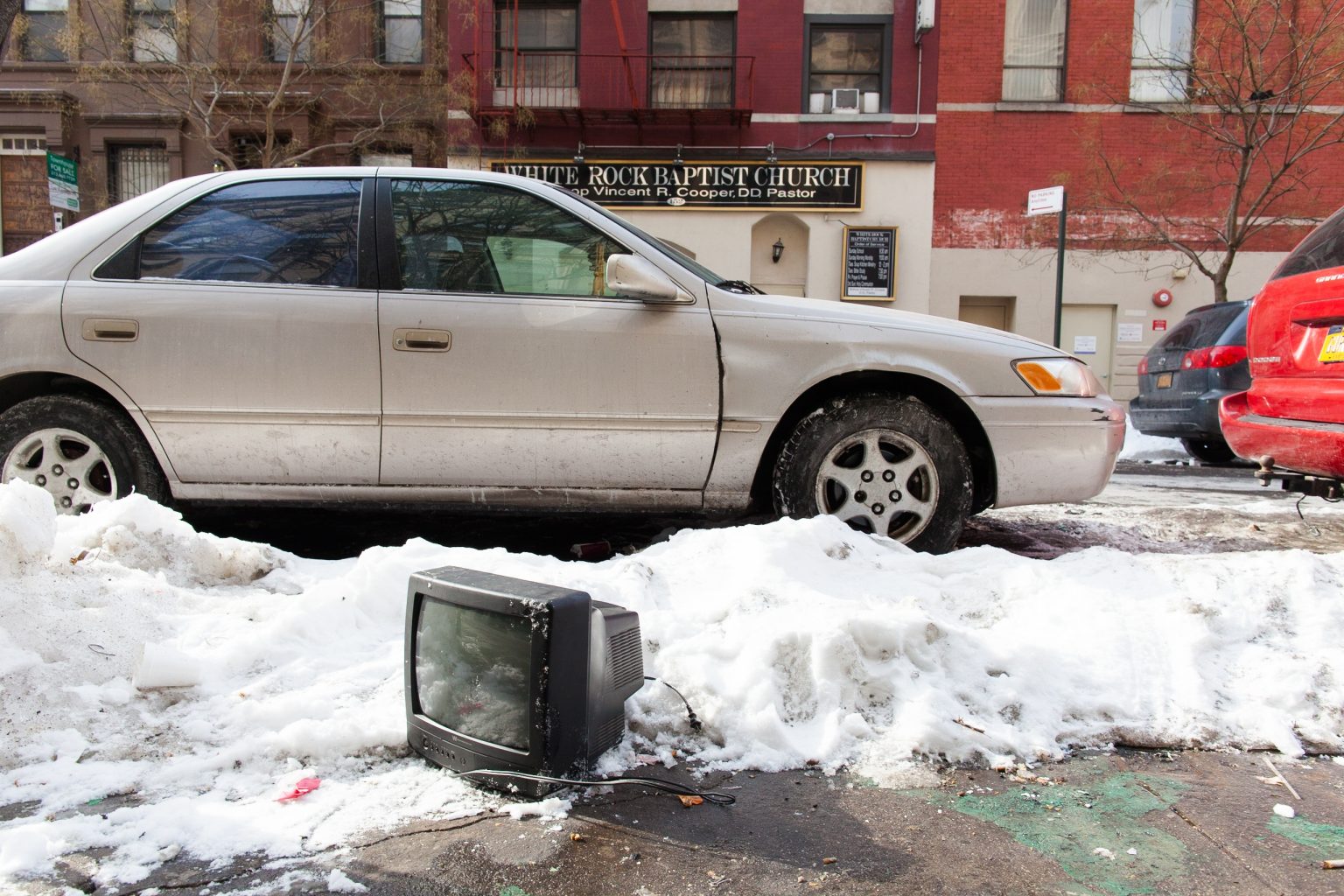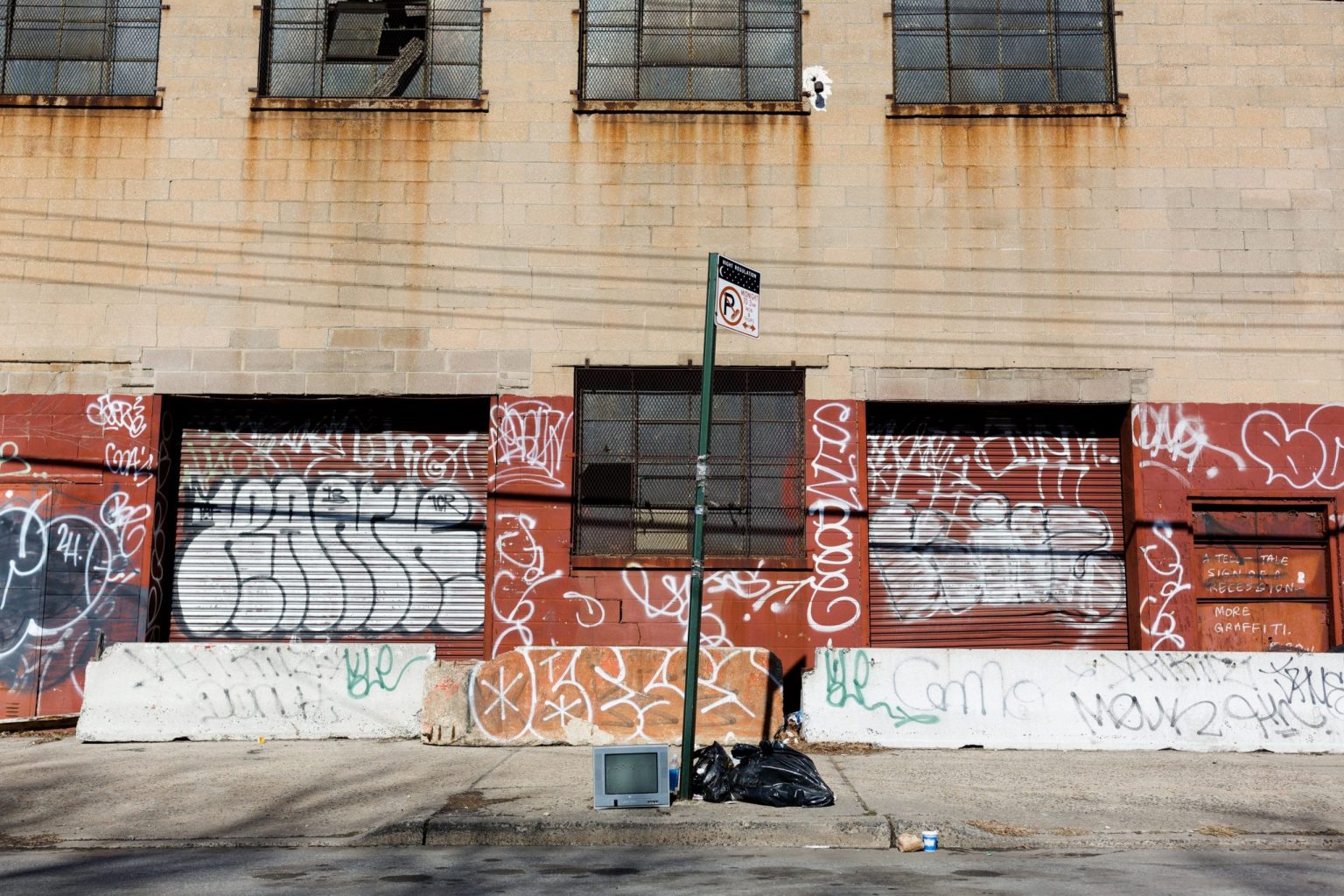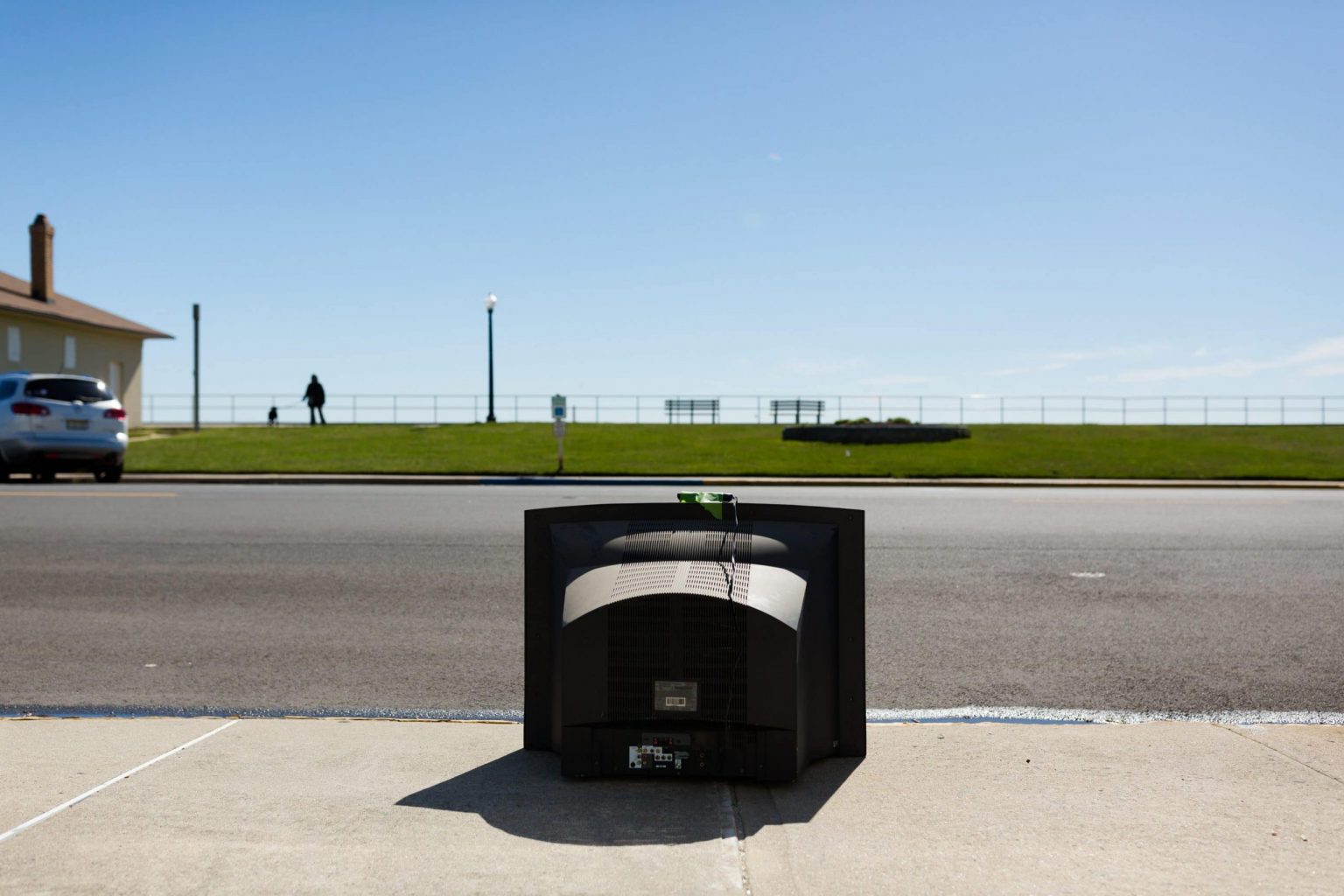The work of a photographer often requires a relationship with an outside party. A career is made up of being commissioned to shoot a campaign, selling a piece of work to a client, or sharing photos for somebody else to hopefully double tap. Reaching those opportunities and succeeding comes back to impressing an unlikely entity.
Yourself.
The personal project has been a critical part of any creator’s journey. It’s the act of putting personal interests above those of anybody else, and, in the process of greater self-understanding, developing technical skills as well as gaining confidence to share what’s created as a private form of expression with strangers.
Ryan Struck released a personal series that did exactly that. “Rockaway TVs” encompasses a body of work half a decade in the making that features abandoned TV sets amidst America’s urban sprawl. The television has played a powerful role in the lives of many developed countries. They serve as, in the words of Struck, “the bearers of bad news, good tidings, and a barrage of advertising sandwiched in between.” Once their roles finish, likely to be replaced by a digital device or a new model, we see them quickly disposed of and no longer worth their previously hyper-engaging value.
From archaeology to photography and now directing, Struck reflects back on the power of the personal project. As a lonely 10-year old, the television in his bedroom at 10pm would serve as his guardian. The purity of this personal project makes up a photo series that is both intimate and unique. It’s also a powerful vehicle to reach a broader audience, which is how this conversation started.

I noticed is that they’re almost all old-school TVs. There aren’t any flat screens.
You picked up on something for sure. I wasn’t going to show a flat screen TV. What’s way more interesting is when you find a TV, and you’re like “holy shit is that from the ’80s?! Like, what is that?” It reminds me of when I grew up and went to somebody’s house in the ’90s, and you’d ask yourself where the hell that came from. It’s definitely an ode to the design of televisions. And it purposely left out flat screen TVs because they look like computers.
What led you to release it now?
I thought to myself, ‘should I wait 20 years to release this stuff?’ I ultimately arrived at the answer of no. I should just release it now for a handful of reasons. It’s new work I can share. It’s interesting (to me). The ideas of what you create or what’s interesting to you changes. And if I’m excited about something like this now, it can be understood, and people can still look at these TVs and ask ”wait when is that from or where is that?” I might as well just put it out there now.

When did you start the series and how did you approach it?
It was a year after Hurricane Sandy in 2013. It’s been about five years since I started. I shot it on everything from 35mm,120mm film, and 120mm infrared, to digital. Each allowed me to explore the medium differently. Shooting it on film meant I couldn’t see it right away and shooting it on digital meant I could shoot it 20 different ways. Shooting personal work is a practice of the medium. And it allows you to experiment and do things in a way you wouldn’t do on set. If you had the pressure of the client who needs this photo and they need to move on this, you’ve got to focus on the shot list. You have to make sure you get it right. Yes, sometimes you can experiment on set, and it can turn out amazing, but more often than not you don’t have that time. On your personal projects, you can perfect the technique and bring it to the set and really make something incredible because you know how to do it.
What’s the role of personal work for you as a creative?
Shooting personal work keeps you sharp. The nature of this industry or this work is that it’s an ebb and flow. Sometimes your inbox is flooding; you’re waist deep and, you’re shooting all week long and then the next week, and all month long. But all of August was pretty quiet. I don’t know if I was hired once in August. In May, June, and July, I was so busy, and it seemed like something new was popping up all the time, and it’s really exciting. But it was great to have that downtime in August because now September and October are super busy.
But I kept shooting. I didn’t put down the camera. I’d go out to the bar with my friends, and sometimes I’d bring my camera. Sometimes things hit you, or you see something, and it’s like you know what I’m going to take a picture on my iPhone. But there’s something different about removing your brain from that and just putting it into the eyepiece of your camera. Ultimately, personal work keeps you going and keeps you motivated especially in that downtime. And I mean even when you’re busy sometimes I’m like shooting the shit for myself, and I’m just happy to be in the moment.
“To be a photographer or a filmmaker is to have a perspective. You have to put yourself forward, and that is a really scary thing to do. ”

How do you feel about people who don’t want to create personal work because they’re tired or they’re disinterested in non-commercial work?
There’s plenty of photographers who told me, ‘my camera? I don’t use it unless I get hired, and that’s it, and then I put it away.’ If that’s the case, you don’t really fucking love it. You could come to me in six months and it could be the middle of the winter and I’m complaining I have nothing to shoot. But really, I could kick myself in the ass and question myself why don’t I have anything to shoot. I can get on a plane or I could walk down the street, it’s really up to you. You can’t always control the creative flow. When the flow hits you, you can’t help to draw it out. If you’re not keeping that spirit in your own orbit then you’re doing a disservice to yourself and your crowd.
Do you feel that once something emerges into the real world that you will have a different relationship with it or does it remain the same?
Dude that’s the coolest question man. It affects me for sure. We all want to say ‘I don’t care what anybody thinks.’ But really it matters to a certain degree. When I was shooting these TVs, I would shoot this work by myself most of the time or be in a car with an old girlfriend. It’s funny because what this taught me was being comfortable with myself and the work that I’m making. I usually had somebody I was with that I really trusted like an ex-girlfriend help me point out TVs, and we’d pull over and shoot them. So in a way, I had somebody with me who would validate my work before I even made it. Yet, eventually, when you release it into the world, you’re putting it out there for strangers to see. If people receive it in a positive light, it makes me feel a bit more passionate about it.
For a long-term project like this that spans pretty much half a decade, how does patience help you in your process?
There is something to say about work that takes you a while to complete. When I’m shooting for myself, I want to like the work that I make. If you can revisit work that you’ve shot in the past, and still like it because it’s stood the test of time, that’s significant. And it only has to be significant for you. When it comes to personal work, it’s only important to me and that it makes me happy. I’m only trying to impress myself.
Yeah it’s exactly how this conversation came about right?
Sometimes an idea is just in my hand, and I think to myself, “this is dumb, nobody’s going to care.” It was just something that amused me due to my weird relationship with a TV growing up. But when other people see it, I think, “yeah I wasn’t wrong.” Artists are creative people, and we all want to think, “Nah we don’t give a fuck man, we don’t care blah blah blah.” Some people are better than me at it, but I definitely do think about it and whether things will be received well or understood. I am a curator of my own work, and you could say a photographer is somebody who’s looking for great light or flipping the script, or really they’re just curating their work well.

What’s your advice for people who are paralyzed with starting and that never gain any momentum.
People need to just jump in because there’s my way, but it’s not going to work for you. In this industry, how I did it won’t work for you. I can tell you how, but everybody has got a unique little path and you have to have the gumption to do it. I feel lucky that I didn’t think about things so much before. I read a quote once that said you perform your life’s work in your ’20s and I think that’s correct because you don’t really think about shit when you’re in your 20s. You just do it and then now that I find that I’m in my 30s, I think about things 30 different ways and I’m like “oh, is this going to work or should I do this?” You’re more calculated which is really helpful obviously in so many things in life. But there’s something to be said about just doing something just because.
Having said that, how do you maintain inspiration and excitement as you progress in your career?
What is really important is for people to read. I’ll just read mad shit and magazine pieces are great because let’s say you pick up Time, National Geographic or like, the New Yorker. You can read a really good article that has 10 photos that help tell the story. What that does is help your brain visualize what the writers talking about. We’re in this visual culture and society now and people with the most followers and likes. Their shit’s getting seen, but they don’t necessarily have the best photos. People are copying what they see more often than not. If they read more, maybe they would have a broader imagination. I think that helps you form these greater narratives, about yourself and about the things that you’re seeing.

One thing I’ve picked up on from this conversation is the importance of the personal project and the need to create something and just put it out there.
For me photography, was always trying to figure out if I could do it and having enough confidence in myself. To be a photographer or a filmmaker is to have a perspective. You have to put yourself forward, and that is a really scary thing to do. It took me a while to call myself a photographer. Now my work is moving in a filmmaking direction which is awesome and exciting. But it took me a bit to also acknowledge that I’m a director too. I didn’t study filmmaking, and I went to school for history and archaeology, so I think to myself, “who the hell am I to call myself a photographer and now director?” But that’s what you have to do and if you want to do what you’re passionate about, you’ve got to create that role for yourself. What I’d like to impart on other people is that you can do anything that you want to do. I think that I took that to heart as a kid. I would have these cool ideas, like “I want to be a fireman” or “I might I want to try archaeology.”
If you jump in, you’ll find out if you don’t like doing it. If you don’t like doing it, then do something else. People reach out to me and ask for help and I’m always going to be there for people invite others to explore their curiosity. Taking a chance and leap on something is so worth the failure because of what you’ll learn. But you also may step right into something that you succeed at, and that fulfills you and that makes you happy. And if anything I want to share that with other people and know “hey you can do this too.”




























